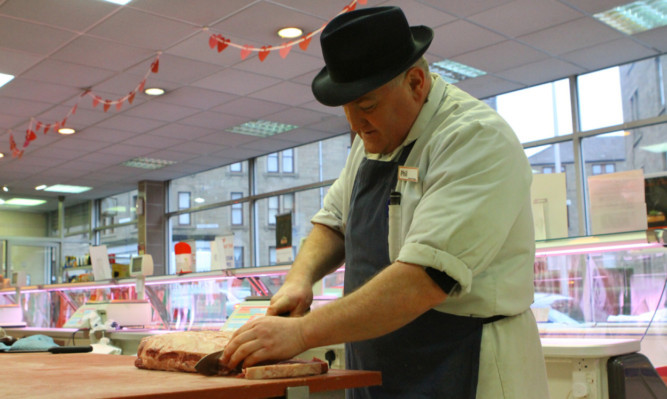Butchers across Central Scotland, Fife and Tayside have seen trade soar by as much as 25% in the wake of the horsemeat scandal.
According to businesses, bumper numbers of shoppers are turning their backs on supermarket frozen food in favour of fully traceable, locally-reared quality Scottish meat products.
The Scottish Federation of Meat Traders Association carried out a survey of its members on Monday and this revealed the positive influx of new business to Scotland’s butchers.
Over the last 10 days this has ranged from between a 1% and considerable 25% increase in overall sales.
According to the association’s chief executive, Douglas Scott, as rural populations already have more of an affinity with shopping locally, butchers with stores in urban locations have become the greatest winners from the latest change of consumer behaviour.
“Shoppers in Scotland’s towns and cities have increasingly turned to their local butchers over the last week or so because they are in search of the assurance offered by Scotland’s supply chain,” he said.
Put simply, customers want to know exactly what it is they are eating and where it has come from, he explained.
“People know their local butcher or farmers’ market will provide the trust and integrity which they are looking for at this moment and time they clearly aren’t getting that from the supermarket supply chain.”
The results from the SFMTA survey showed meat products such as mince and burgers enjoyed the greatest jump in sales.
In Dundee, George Jarron said the Scott Brothers butchers stores in the city centre and Broughty Ferry saw sales increase by 10% last weekend.
“We’ve certainly noticed consumer shopping patterns have changed,” he said.
“We are seeing more new faces and an increase in the regularity that current shoppers return to our stores. The horsemeat scandal has led customers to have second thoughts about picking anything up in a supermarket.”
The crisis in consumer confidence with Britain’s large supermarkets follows the revelation from the Food Standards Agency that Findus lasagne dishes, labelled and sold as beef, were in fact 100% horsemeat.
The extraordinary route that horsemeat products have taken to get to shop shelves in Scotland via Poland, Ireland and the North of England has highlighted for many consumers just how convoluted the meat trade is at the lower end of the market.
“Bolognese and lasagne style dishes are the mainstay of midweek dinners,” Mr Jarron added.
“But where the international food chain has clearly struggled, our supply chain has not. We provide these dishes with full Scottish provenance and quality. In exactly the same way as our grandfather did before us, we can trace our Scottish produce right back to the local farm it was reared on.”
The cast-iron supply chain which sees Will Docker sell his own family-reared livestock through his own butchers within the Balgove Larder, outside St Andrews, has also seen sales jump about 15% in the last 10 days.
“There has been an extraordinary interest in our produce from new customers,” Mr Docker said.
“The integrity of the international supply chain really has just been a ticking time bomb. At least now customers have a renewed understanding that it is paramount you should know exactly what you are eating and where it has come from.”
For more on this story see Wednesday’s Courier or try our digital edition.
